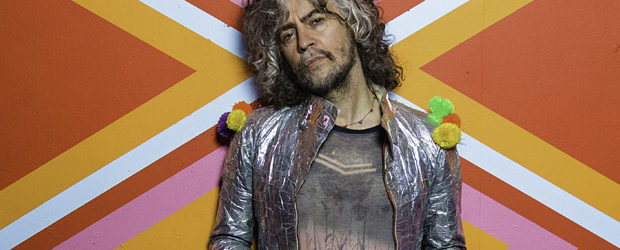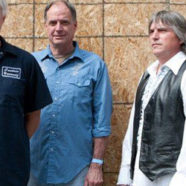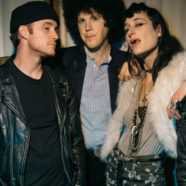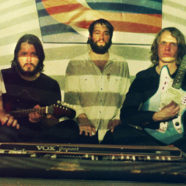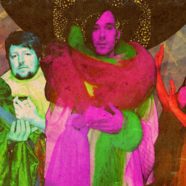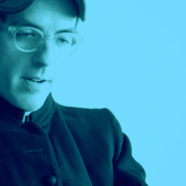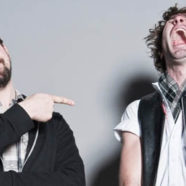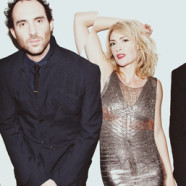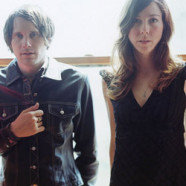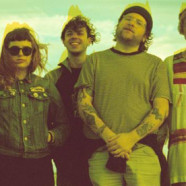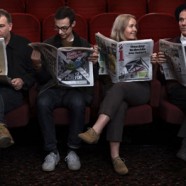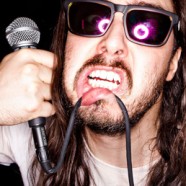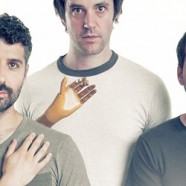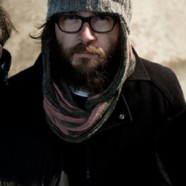I think in the very beginning we started to do this big show because we were just all these sort of, I wouldn’t say shy, but we’re just not extroverts and not born performers. We were all very embarrassed about standing there in front of people playing, even though we loved making music and making records and recording and stuff. When we had to get up there in front of people, it always just feels kind of awkward. I think we started to create this spectacle so we could feel like, ‘oh you’re not really watching us, you’re just watching this stuff and we’ll play the music while you watch all this stuff.’ I think that helped us stand there and not feel so awkward about it.
BY AMANDA SANCHEZ AND JAY GENTILE
PHOTO BY GEORGE SALISBURY
Wayne Coyne has never been shy about getting weird. In fact, he’s made a career out of it. Famous for their outrageously over-the-top live shows which may or may not include freaky inflatable animals, surreal dancing suns, trippy psychedelics and Coyne’s trademark inflatable crowd-surfing bubble, what has been described as “rock’s greatest acid punch party” is now synonymous with The Flaming Lips. But it wasn’t always this way. In the outskirts of Oklahoma City in 1983, they were just another band trying to find their sound.
Warner Brothers signed the band after seeing them nearly burn down a Norman, Oklahoma, venue in the early ‘90s with crazy pyrotechnics and, shortly after, the Lips released their first and only mainstream hit with 1993’s “She Don’t Use Jelly.” Following a series of bizarre antics including the “parking lot experiments” which surrounded the 1997 release of their 4-CD album Zaireeka (in which dozens of volunteers were given cassette tapes created by the band to be played in their cars simultaneously), the band scored its first taste of critical acclaim with 1999’s The Soft Bulletin, laying the foundation for their current experimental psychedelic rock sound centered around oddball themes, spacey lyrics, and lush harmonic orchestration.
They’ve released albums in gummy skulls (as in 2011’s Gummy Song Skull, a 7-pound gummy skull with a flash drive containing four songs.) They’ve set the Guinness World Record for playing eight shows in the span of 24 hours. They’ve even had one of their most famous tracks, “Do You Realize??”, named as the “official rock song of Oklahoma.” After taking a much darker turn on 2013’s The Terror, the Lips are back with their newest and fourteenth album Oczy Mlody, a 12-track back-to-basics return to Soft Bulletin-style form whose Polish title (meaning “eyes of the young”) was inspired by a recent trip Coyne took to a secondhand bookstore.
Chicago INNERVIEW rang up Coyne to speak with the longtime Flaming Lips master of ceremonies about the band’s life-affirming live shows, recording with Miley Cyrus, and what he’s learned about himself after a tumultuous 30 years in the music business.
Chicago INNERVIEW: Your music style has changed quite a bit over the years, evolving from punk to a more experimental sound. What inspired the change?
Wayne Coyne: Well, I think when we discovered that we had lasted longer than one or two records, which in the beginning in 1983 or ‘84 whenever we did our very first record, you don’t really think or wouldn’t want to think that you’re going to be around. Ya know, I was 22 years old then and then to think ‘Wayne, you’re still going to be making records when you’re 56 years old called The Flaming Lips’, I think we would have just said ‘no! That’s insane, who wants to do that?’ So as we went along, I think you just find that you’re a different person and you have different music and different things that have influenced me and stuff. And so it’s probably just all that, and I’d be lucky that I would run into different people that would sort of influence the group. When we started we would, we couldn’t and we still can’t — [bassist] Michael [Ivins] and I are still not really very good musicians — so in the early days, we could only play so much just based on our inability. We attracted these marvelous musicians. I mean, [songwriter/multi-instrumentalist] Steven [Drozd], the other writer in the band with me, he’s like a master musician. He can do anything. So I think what we did in the very beginning was limited to our abilities. Then as we went, it opened up because we had this other very skilled person in the group and then running into producers and stuff like that and then they help you let it all evolve. Mostly just we didn’t know what we were doing in the beginning, and then you just keep trying things and stumbling upon different things.
Chicago INNERVIEW: It’s been said that you put on life-affirming shows and that they are uplifting testaments to the best of humanity. Is there a message or philosophy behind them about how we should all live our lives?
Wayne Coyne: [laughs] Um, well I don’t think there is one on purpose. I think over the years we have, little by little, attracted that kind of audience. I don’t think in the beginning of starting to do that type of music like you just said, I don’t think we would have been aware of it. I think we just would’ve been drawn to it, and I think that draws an audience that likes that. Nowadays I think we have such a big audience that is like that, that if somebody was to come to a concert they could easily be overwhelmed and be like ‘yes, this so life-affirming!’ It’s probably something to do with my personality. I wouldn’t really know like, ‘oh is it this or that.’ Just in time, you just veer towards this thing that is just this little subconscious coloring of it. I would say that now, because I look back all the time at things The Flaming Lips have done and I get that same feeling. But no, I don’t think we would have known that. When it began to happen we probably would have just said, ‘oh that’s just a song we are doing, that’s not us.’ We would have always just denied it.
CI: So it’s just kind of something that happened more or less?
WC: Yeah, I think it’s like all art or all music. You wouldn’t be able to do it if it really wasn’t you. That’s what I see in everybody I meet. It would be impossible to know, to just pick something and say ‘oh I think I’ll be that way.’ Your music is like a lie detector test. It tells the truth about you, whether you want it to or not. What sometimes people’s music says about them is that they’re fakes. Music just doesn’t allow you to be a fake. It is what you are and that’s a tough lesson to learn. A lot of people want to just do music and make something cool and popular or whatever. You may get popular, you may get famous or anything, but in the long run your music is really going to represent you, whether for better or worse, ya know.
CI: Your group has been described as ‘one of the top 50 bands to see before you die’. How do you keep your shows so fun and interesting?
WC: [laughs] People always mention that a lot. I always like the idea that they have to put in there ‘before you die’, as if they could see us after you die. ‘After you die maybe you could see other groups, but you have to see The Flaming Lips before you die.’ Well yeah, I think that’s one of the greatest things that can be said about anybody who’s up there singing their songs and putting on this big spectacle. I remember when they said that and people have asked me about it ever since, and that was a long time ago when they said that so it’s great. And I think it’s a great, not a challenge, but a great like, ‘oh cool we’ll live up to that if you believe that we can live up to that.’ So yeah, I think it’s part of our grandiose thing that happens when we go up there and, I don’t know, there’s some elements that are just indefensible about the type of music that you’re going to and the type of show that you want to put on. A lot of times people ask me, sometimes it just seems that the show should overwhelm the music and I’m like, ‘yeah I could see that.’ I think in the very beginning we started to do this big show because we were just all these sort of, I wouldn’t say shy, but we’re just not extroverts and not born performers. We were all very embarrassed about standing there in front of people playing, even though we loved making music and making records and recording and stuff. When we had to get up there in front of people, it always just feels kind of awkward. I think we started to create this spectacle so we could feel like, ‘oh you’re not really watching us, you’re just watching this stuff and we’ll play the music while you watch all this stuff.’ I think that helped us stand there and not feel so awkward about it.
CI: I read about your art exhibit in 2015. Do you get the same sort of inspiration making physical art as you do making music? Is it any similar or different?
WC: Well, I think they are all offshoots of the same creative drive. At the time when I was younger, I didn’t do music. I would simply listen to it. I would mess around with my older sister’s guitar that she had. But I always was, I could always paint and draw and I kinda liked doing little stories and stuff. I remember even when I was — I was probably like 15 or 16 years old — thinking it just seems boring, I don’t wanna just sit here by myself all the time. And at the time, I come from a big family and our house was insanely busy all the time. I got older brothers and sisters and they had tons of friends and people doing drugs and playing music and all kinds of just everything always happening at one time. So I think I got very used to making this art and being isolated, even if it’s just in my own mind, amongst all this chaos. But I never wanted to be away from the chaos, and I think being in The Flaming Lips was my way of keeping the chaos of this big crazy family in my life all the time, ‘cuz I think I would never want to just move away and live in the mountains and not be part of it. I think the band and the music is such a collaborative entity. I think music is made better for that, it’s made better when you have all these influences on your own little ideas of it. I don’t think I would want to do art as much if I wasn’t making music. I think I would probably lose my energy and my focus on all that and music is, I think, it’s the most expressive magical art there is. They’re all magic, don’t get me wrong, but I think it still has a magical mystery to it.
CI: You’ve been in the music industry since the ‘80s. What have you learned about yourself throughout the years?
WC: Well, I mean in the very beginning I don’t think we thought that we were in the music industry. In the very beginning we were just doing music like bands that we would see, we were just being in a band, and being in the music industry we would just be like, ‘oh no, we’re not doing that.’ But I think as the early ‘90s rolled along, we got signed to Warner Brothers and I think we embraced the idea of ‘oh cool, we’re a part of this thing and let’s make it work for us’ instead of the stories you hear so often of the music industry [that] swallows up these unique artists and throws them out and they’re left with nothing. I think we had already found out quite a bit about how we thought we could make music and we tried to convince Warner Brothers ‘if you just give us money and encourage us, we’ll do all the other stuff.’ I think we were very lucky that the people we ran into at Warner Brothers wanted that. They loved the records we had been making and they thought that we would continue to make cool, unique records and that that would be something that Warner Brothers would be proud to have. The rest of it is kind of not up to them or us to become a big, famous, selling group. That very promise from the beginning of ‘let’s just try, if you give us some money and help us, we’ll deliver some really fantastic records,’ that still is true today. That’s the relationship we have with Warner Brothers. We don’t know how to sell records, we don’t know how to play the Super Bowl or anything like that, but we are definitely focused and committed to doing this thing.
CI: You’ve worked a lot with different artists, from Miley Cyrus to Bon Iver. As those are obviously pretty different types of music, did you just want to collaborate with all different kinds of styles?
WC: Well I think anybody’s music that you like — if you like the music that they’re making — there is already a little bit of a bond. And I think with musicians and stuff like that, that’s not that weird for someone, say like Justin Vernon from Bon Iver, to like The Flaming Lips, and even him, he’s on Kanye West’s records and stuff. I mean, musicians don’t think of it as that they are in different categories. Most musicians all feel like we are basically just doing music and that we could like jazz or country music. Most musicians love all kinds of music. I think I’m just very lucky that a lot of the people I like, when I’ve reached out to them, they would happen to be fans of The Flaming Lips and then I could say, ‘hey let’s try to do a little bit of something together.’ So just mostly luck, there hasn’t been that many people that we’ve reached out to that we didn’t eventually do something with. I mean, I haven’t asked Beyoncé or anything [laughs]. Knowing Miley Cyrus, a lot of that is because she’s a fan of The Flaming Lips. So even though we were fans of hers, it would be difficult to get ahold of her if she didn’t like us. I think it kind of has to play both ways.
THE FLAMING LIPS
APRIL 17 @ THE RIVIERA
8 PM LISTEN
$45+ TICKETS




